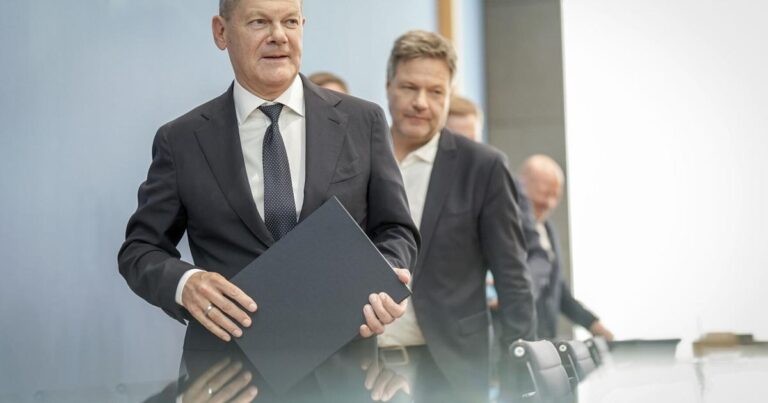BERLIN (AP) — The German government said Friday it had reached an agreement on the 2025 budget and stimulus package for Europe’s largest economy, easing months of wrangling that had threatened to topple Chancellor Olaf Scholz’s center-left coalition.
Chancellor Olaf Scholz of the Social Democrats and leaders of the Free Democrats and Greens agreed on the plan, which includes boosting defense spending and promoting affordable housing, after marathon talks that stretched into the early hours of Friday. Scholz said his cabinet would formally approve the plan at a cabinet meeting later this month.
By balancing security, social cohesion and economic growth, Scholz said the budget was designed to reassure a population worried by the war in Ukraine, the effects of climate change and illegal immigration, and offer an alternative to the “divisive” policies of far-right parties gaining power in Europe.
“We don’t need either/or politics,” Scholz said. “We want help for Ukraine and stable pensions, industrial modernization and affordable energy, a strong military, good roads and stable bridges.”
Scholz succeeded long-time conservative Chancellor Angela Merkel after the 2011 federal election and led a coalition government based on a modernization and digitalization program in areas such as climate protection, infrastructure and research.
To cover the costs, the government got around rules limiting public borrowing by recycling 60 billion euros ($65 billion) of unused emergency loans raised for measures to cushion the impact of the COVID-19 pandemic.
But the move was ruled unlawful by the Federal Constitutional Court in November 2023, prompting the government to quickly seek spending cuts in areas ranging from agricultural subsidies to overseas development aid.
The austerity measures have caused rifts within the Social Democrats and between the fiscally conservative Free Democrats and the environmentalist Greens, with the latter calling on parliament to halt the so-called “debt brake” and allow further emergency borrowing, including to continue supporting Ukraine in its war with Russia.
The disagreements have led to the collapse of an already unpopular government, triggering early parliamentary elections and raising speculation that Germany could follow other European countries in moving politically to the right.
Opposition leaders said Friday they were skeptical of the government’s budget calculations, particularly its ability to cover the expanded defence budget, and predicted renewed clashes between coalition partners over details.
Merkel’s successor, Christian Democratic Union leader Friedrich Merz, dismissed the agreement as a “truce for an exhausted coalition government.” “Once parliament’s recess ends in September, discussions will begin in earnest.”
But Scholz said coalition leaders had drawn up a budget that provided funding for all three parties’ priority areas while respecting borrowing limits.
To support economic growth, the government plans to create investment incentives by helping companies write down the value of their assets more quickly, supporting research and development, cutting red tape and encouraging the development of renewable energy sources.
Scholz also said the German government would continue to meet NATO’s target of spending at least 2 percent of GDP on defense, despite the defense minister’s failure to push through a significant increase. Germany is Ukraine’s second-largest arms supplier after the United States.
“Germany must be a key player in European stability,” he said. “As a central continent with strategic importance, economic power and political influence, it cannot turn its back on the world.”
Copyright 2024 The Associated Press. All rights reserved. This material may not be published, broadcast, rewritten or redistributed without permission.


